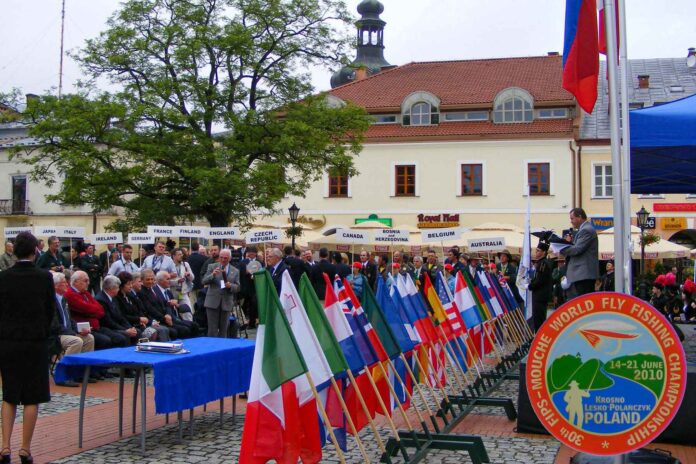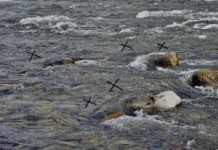After Team USA won its first international fly-fishing competition over the summer — a team win in the FIPS-Mouche Masters (over 50 division) World Fly Fishing Championship in Madonna de Compiglio, Italy — it was safe to wonder if competitive fly fishing could actually take off in the United States.
But, according to one prominent member of America’s international fly fishing team, it’s not a likely proposition.
“First, most Americans don’t know anything about it,” said Team USA board member Lance Egan, referencing the international fly-fishing competition. “They don’t know how it works, and there just isn’t an interest in making fly fishing a competitive sport in the United States.”
Egan, who returned to the U.S. in October after competing in the FIPS-Mouche World Championship in Spain — Team USA finished sixth — noted that efforts have come and gone in the states, but there are significant elements missing if any such effort is to eventually succeed.
“Whenever we travel abroad to compete, one of the first things we notice about the other international teams is the corporate support they receive,” Egan said. “When we got to Spain, the other teams were decked out in logo gear provided to them by their corporate sponsors. Here in the United States, there’s very little corporate support from the fly fishing industry for competitive fly fishing.”
That would, indeed, seem to be an important missing element if fly fishing enthusiasts were to get behind a competitive fly fishing endeavor in America. Another missing link?
“By rule,” Egan said, “there’s no prize money in international fly fishing. It’s strictly forbidden.”
That, of course, doesn’t mean an independent effort to create a competitive fly fishing tour in the United States wouldn’t be able to gather up a host of sponsors, work with fishy destinations and then offer enough prize money to craft competitive events that might appeal to the best fly anglers in the country. But so far, that hasn’t happened, and Egan doesn’t expect that it ever will.
Unlike the wildly successful B.A.S.S. productions, which attract thousands of interested bass anglers and spectators to multiple Bassmaster events in multiple age classes, there is no recognized American equivalent in the fly fishing space. B.A.S.S. also has no shortage of corporate sponsors that want to attach their names to Bassmaster events. For example, in March 2023, B.A.S.S. will conduct the Academy Sports & Outdoors Bassmaster Classic presented by Huk. That’s preceded by the Bassmaster College Series that starts in January and is sponsored by Strike King and Bass Pro Shops. And, yes, there’s a high school Bassmaster event — it’s sponsored by Abu Garcia and Academy.
The big difference, of course, is participation. According to the American Sportfishing Association’s 2022 Special Report on Fishing, there were more than 40.5 million Americans who considered themselves freshwater anglers in 2021. That same report notes that there were just 7.5 million fly fishers that same year (and that’s down 300,000 from 2020 numbers, when the COVID pandemic resulted in a marked spike in fly fishing participation). While the study doesn’t differentiate between the types of species anglers are pursuing, it can be inferred that fishing for bass with spinning or baitcast gear is many times more popular than fly fishing for trout among the American public.
Another difference? The water. Bassmaster tournaments take place on large lakes and reservoirs, and participants motor all around these impoundments, decked out in sponsored gear, driving sponsored boats and using sponsored equipment. The impact on the fisheries? Perhaps it’s significant in the short term, as bass are plucked from the water, stored in live wells and weighed and measured each day before being released. But consider what that might look like in the fly fishing world, where habitable trout water (assuming trout would be the targeted species) is a bit harder to come by.
An informal poll of fly fishers conducted on Facebook recently showed a lack of support for competitive fly fishing in the United States. In fact, the opposition wasn’t only against the idea; it was steadfastly opposed, going so far as to comment on the social platform that competitive fly fishing would have such a negative impact on trout water that it would ruin fly fishing altogether. In all, a full 83 percent of those responding opposed the idea of a competitive fly fishing “tour” or event in the United States. Only 14 percent supported the notion, with 3 percent falling into the “maybe” category. One caveat: many who responded and commented said they might get behind a fly fishing competition that was conducted on private water, but not on publicly accessible water.
So, while many in the American fly fishing community are celebrating the nation’s first-ever international victory in the FIPS-Mouche arena, the majority of fly anglers don’t want anything to do with a competitive, highly marketed, heavily commercialized tour in this country.
Corporate interests who serve the much smaller and much more subdued fly-fishing community likely see the same trend, and until that trend changes (and let’s face it, that’s not likely), there won’t be corporate support for competitive fly fishing in the U.S.
“I think, in the U.S. market, potential corporate sponsors are dead scared of the idea of competitive fly fishing,” Egan said. “None of them that I know of have ever tried to use competition for marketing.”
To date, the only credible effort at creating a competitive fly fishing tour in the U.S., similar to, say, the PGA Golf Tour, happened in 2014, and winners of the events were left high and dry by the event promoter when the effort apparently failed financially. A similar effort appeared to be under way this fall, but nothing has come from a promotional website for the “Pro Fly Fishing Tour” that goes so far as to list potential sponsors — replete with company logos and implied relationships — and competitors, including Egan.
An angler competes in the FIPS-Mouche World Fly Fishing Championships earlier this year in Spain (photo: Lance Egan).
“I have no idea what that’s about,” Egan said, noting that he’s tried to contact the website’s owner to have his name removed, but, as of this writing, has not had any success. Hatch Magazine reached out to the owner of the website via an email address provided on the site, but no response has been received.
But competitive fly fishing does exist in the United States, albeit at the non-professional level. The non-profit Fly Fishing Team USA national team conducts regional “mini tournaments” to choose the anglers who venture to the various FIPS-Mouche world championship events every year. Granted, with no prize money, these events aren’t heavily marketed. But, in many cases, they do take place on public water, or at least water that is publicly accessible.
And, Egan said, the willful participation in competitions is fairly muted in the United States.
“I would say, nationwide, that there are maybe 100 people who compete regularly” in Team USA-focused events, Egan noted. “In other countries, there are thousands.” And, he said, unless anglers are actively seeking out the qualifying Team USA events, “you’ll probably miss the chance to compete.”
The competition statistic, by itself, might be more telling than any other. As Egan notes, that’s also why many of the technical advancements in fly fishing come from Europe, where the competition is rigorous. Euro-nymphing is a prime example — with competition comes innovation, and, welcome or not, those innovations find their way to America (Perdigon nymph, anyone?). The lack of a competitive establishment in the U.S. “does slow the technique advancement,” Egan said, noting that American anglers are often behind the curve set by competitive international anglers, particularly those in Europe.
But none of that seems to matter to American anglers, who seem, at best, indifferent to the idea and at worst, downright hostile. In just three hours, the Facebook poll amassed almost 360 votes and 55 comments.
“Why make everything on this planet a contest?” asked angler Mark McKenna who commented on the aforementioned poll. “Who can catch the most fish? That’s a big ‘who cares?’ for me.”
Credit: Source link































